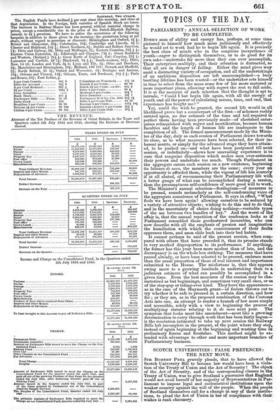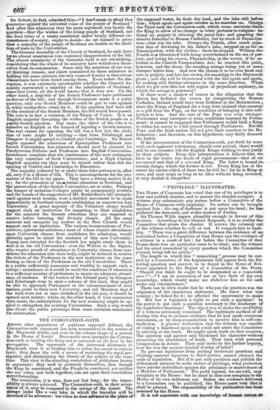SCOTCH UNIVERSITIES: FALSE PRETENCES: THE NEXT MOVE.
SIR ROBERT PEEL gravely pleads, that to have allowed the Scotch University Bill to become law would have been a viola- tion of the Treaty of Union and the Act of Security! The object of the Act of Security, and of the corresponding clauses in the Treaty of Union, was to give Scotland a guarantee that England would not avail herself of her majority of Representatives in Par- liament to impose legal and ecclesiastical institutions upon the weaker country against the will of the people. When the people of Scotland themselves call for a change in any of their institu- tions, to plead the Act of Union in bar of compliance with their. wishes is rank chicanery. Sir Robertin Sad, adinittbdithbv-0 I don't mean :to plead that guarantee againstthe universal voice of the people of Scotland." And after this admission that his mainargument was beside the question—that the wishes ortheliVing people of- Seotland,...not the dead letter of a uty concluded) under -totally different cir- cumatances of society. oughttedecide—he set. himsPlf to prove, that a majority. of the people .ofScotland are hostile. to the:aboli- tion of tests in the :Universities,.
The GeneralAssembly of the Church Scotlandrhe sai
h d, have.
by an almost unanimous vote expressed disapprobation of the bill. The almost unanimity of the venerable body. is not astonishing, considering-that: the whole of its minority have withdrawn them- selves from.dts communion. Sinoeonly the. ministers: of. one -way of thinking remain,, and elders nominatedly these ministers as holding the same opinions, the only cause of wonder is that eleven. dissentients have been found among them. Even before the dis- ruption, it was extremely questionable whether the. GeneralAs- se.mbly represented a. majority of the inhabitants of Scotland.;. since that event,, all. the-world. knows that it. does not.. On,the other hand, a, majority of the Seotch,Professors have petitioned in:favour of the bill; and though Government made it a party question, only nine Scotch Members could be got to vote against it; .while, twenty-three. voted for it.. If the question had been left to. the. decision of the Scotch Members, the billwould havepassed. The voteis in fact a violation, of the Treaty of • Union. It is an English majority thwarting the wishes of the Scotch people on a. purelySootch question: Nay. more, the object of the vote is to: subserve an English at the lazard.of injuring a Scotch-interest.. The realreason for opposing the. bill was a fear lest the aboli- tion. of tests might be catching.— that from Edinburgh and. Glasgow it,miodit.spread to .Oxford and Cambridge. Sir Robert Inglis opposed the. admission of Episcopalian Professors into Scotch, Universities, lest admission should next he claimed. for Presbyterian Fellows, and Professors into English, Universities.. Scotchmen complain that the continuance of the tests endangers. the very existence of. their Universities ; _and a, High. Church English. majority say they must be ruined rather. than risk.the opening of Oxfordand,Cambridge to Dissenters. The majority collectedly oruader these false pretencesis, after. all, only. 8 in a. House of WA. This is encouragement for the pro- moters.of thebillto try again. They have a strong motive to do se- for the promotion of unsastarian education in.Sootlana, and the preservation of the ScotchUniversities, are at stake: Perhaps the danger of sectarianColleges might be permanently averted,. and, the hands,of the supporters of Mr: Rutherfind's bill strength,. wiled against next session, were a-.decided movement to be made immediately in. Scotland towardwestabhabing an.unseetarian Lay University. A great .majority of the. Voluntary clergy-would, support such- an. institution for, imparting. to their. candidates, for the.. ministry the. literary education they are required, to receive before entering the divinity classes.. All the most- eminent and. energetic lay leaders in. the Free Church would support such an institution.. Thewarious ineorporationaof Pro-, curators, ,(provincial solicitors,) most of whom require attendance upon. University classes. from, candidates. for, admission, would probably agree to. admit the students of this new University. Young. men intended for-the Scottish bar might. study there as. well as-in the old.Universities : even the Writers to the Signet,. who require proofs of attendaneein.Univeisity classes from- can- didates.for admission into their bodyrmight be induced to receive the tickets of the-Professors . in the new institution on the same footing as those of the Professors in, the old Universities: There is. a public sufficiently numerous and wealthy to support such a college : attendance. in it couldbe made-the condition of admission to,a.sufficient number of professions to insurean. adequate attend- ance-of students. If the leaders of the Liberal. party in. Glasgow and Edinburgh were to start a scheme of this.kind, they might be: able to approach Parliament at the commencement of next seeaion,point to.their new University, and tell Ministers that if
the tests were i
-not at once abolished. nthe old ones,. it should be opened. next winter; ,while; on. the other hand, if that concession were made, the subscriptions for the new seminarymight be ap- plied to strengthen the existing Universities. Such. a step would also divert the public_ patronage from mere sectarian seminaries for ecclesiastics.



























 Previous page
Previous page